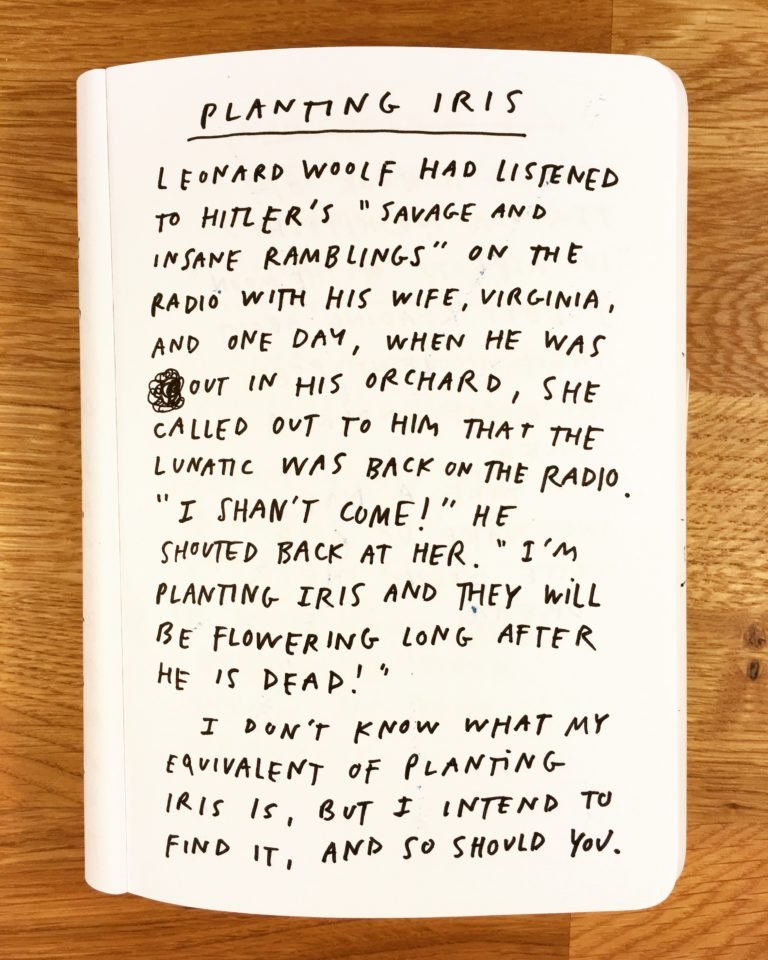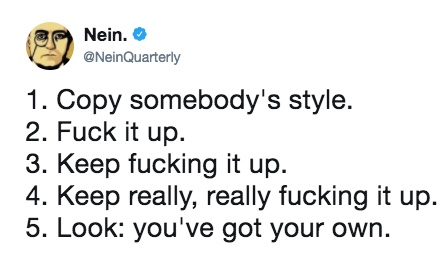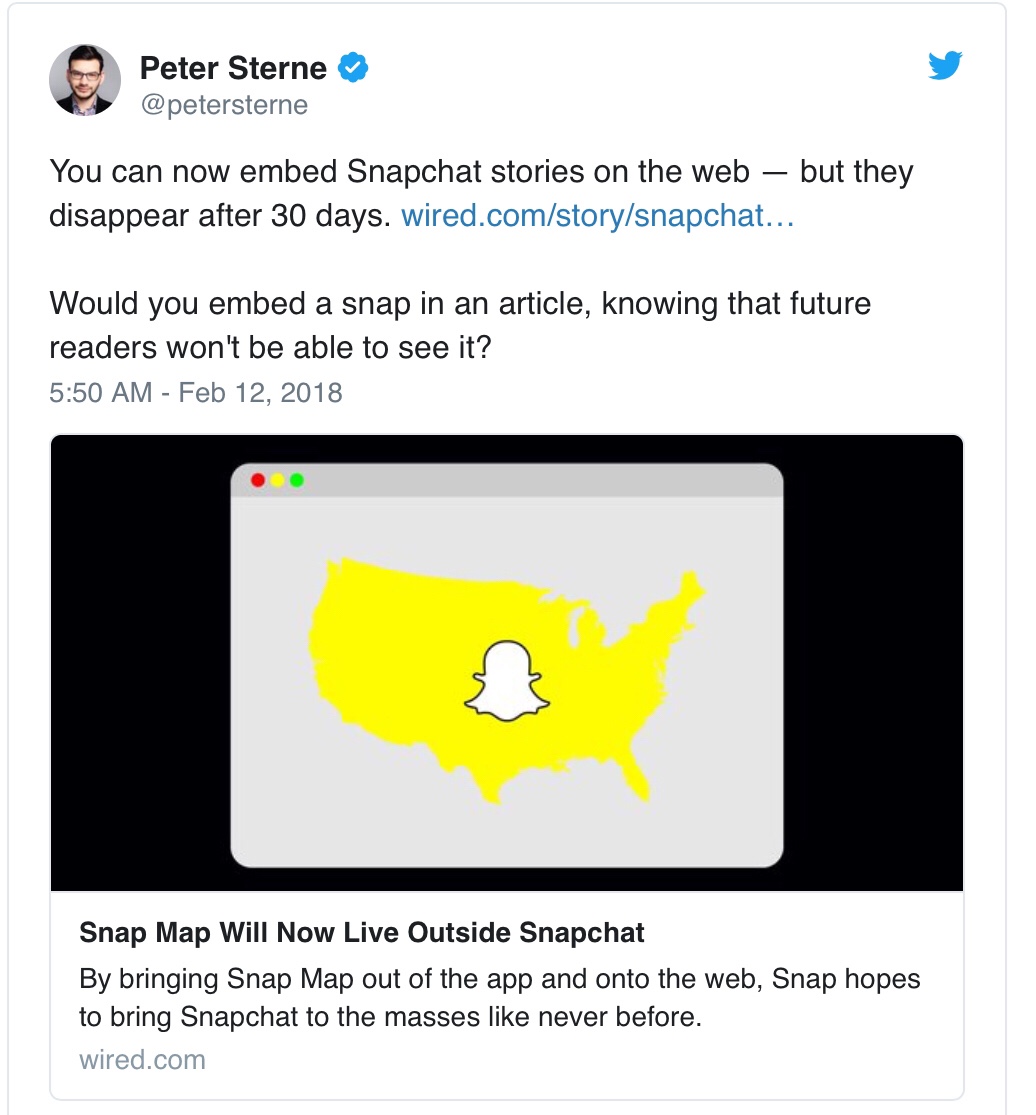Is anything similar happening in the world of media?

Love this. Via austin kleon
“Mall acoustics are fantastic in that they both magnify and mute: the hubbub of commotion reduced to a hush of distinct words. It allows you to both be very much in the moment, and also alone and separate from other people’s experiences should you wish to be.“
- Zan McQuade, How I Learned To Love The Mall
There’s also a bit in here about malls being a cross-section of society that I agree with. My local mall’s food court is, I think, the most diverse place in the city at any given moment. People from other countries know malls. Older people and families can traverse malls easily, especially in winter. Parents are more ok with dropping their kids off at the mall than downtown. I still don’t love spending an afternoon at the mall over, say, a good set of shops on a main street, but I definitely feel more generous towards them.

“Copy out things that you really love. Any book. Put the quotation marks around it, put the date that you’re doing the copying out, and then copy it out. You’ll find that you just soak into that prose, and you’ll find that the comma means something, that it’s there for a reason, and that that adjective is there for a reason, because the copying out, the handwriting, the becoming an apprentice—or in a way, a servant—to that passage in the book makes you see things in it that you wouldn’t see if you just moved your eyes over it, or even if you typed it. If your verbal mind isn’t working, then stop trying to make it work by pushing, and instead, open that spiral notebook, find a book that you like, and copy out a couple paragraphs.”
- Nicholson Baker
Both of these from Austin Kleon’s “Copying Is How We Learn“




“Today when you say “nest egg” many think of money saved and put away, but a literal “nest egg” is a real or fake egg that you put in a nest to encourage a bird or a hen to lay more eggs there. So what Thoreau is saying is that by simply writing down a thought, you encourage more thoughts to come. When you have enough thoughts pushed together in the same space — a collage of thoughts, juxtaposed — they often lead to something totally new.
“This is the magic of writing.”
Whoa.

It’s a chocolate pancakes kind of (mid)morning
What’s nice is that this is something the platform is thinking about. Some of the problems with established social media largely seem to stem from the fact that people weren’t thinking about diversity in the first place. So building into the philosophy of microblog so early on likely bodes well for the future.
With that in mind, these are the potential barriers to adoption I’ve noted as a straight white cisgender male who still values Twitter because it allows me to learn from people who differ from me in a variety of ways: largely Indigenous Canadians, women, and LGBTQ+ people sharing their thoughts and perspectives.
- Privacy — Frequently someone I’m following will put their Twitter feed into “followers only mode” which means you can only see what they’ve written if they have explicitly allowed you to follow them. Or they’ll run a mass block. Facebook, too, has a lot of privacy options, including private groups. This is to avoid harassment, to allow them to navigate the social network without having to deal with strangers.
Micro.blog currently doesn’t have that option that I know of, and I don’t if it’s on the roadmap or if it even makes sense with what it is meant to be. But I wonder if someone who uses a Facebook or Twitter in some form of privacy mode would see the appeal of putting themselves out on Microblog without that option. Of course, the solution would be to have microblog be a community without trolls, but given that it is, ultimately, not a social network but instead built on top of the public web, I’m curious about how that would work– allowing some people to interact with you in a public space but not others.
2. Technical know-how/ability/access — A big moment for Twitter was the Arab spring when social media suddenly became a source of information and coordination for people involved in protests. It largely happened from phones.
I’m trying to imagine a similar event occurring on micro.blog as it is right now– the steps to sign up are relatively complex compared to “what’s your email? Start sharing!” You need to set up an RSS feed from some other site, figure out how to make that site interact properly with micro.blog, etc etc. Granted, a free WordPress or Tumblr page is easy enough to come by, but you don’t see WordPress or Tumblr taking the same central role in these sorts of things as Facebook and Twitter do, for a reason– there’s just that much less friction.
While friction can facilitate more thoughtful conversation, it also can act as a barrier to who joins that conversation, and it’s a difficult trade-off to make, I think. I have no solution to this.
By the way, I’m leaving out the lack of an Android app because I know it’s early days. But realistically, if you’re trying to reach more people from different walks of life, you’re going to want easy access on one of the most widely-adopted phone systems worldwide.
3. Cost — Again, Tumblr and WordPress.com are free but for now the most frictionless point of access to working on microblog is to start using a paid microblog domain. It’s pretty cheap, too! $5 a month is super reasonable.
But not everyone has $5 a month to spend on a relatively new platform – or even an established one. I saw a tweet a while back about how “wealth is being able to buy fancy cheese whenever you want without worrying about rent” and that’s my situation, but it isn’t everyone’s. Yes, you’re the product if you aren’t paying for it, but some people really don’t have that choice.
On this front, I think there may be a solution in the form of patronage. On Kottke.org, Tim Carmody wrote a post on the patron economy that really stuck with me for this line:
“The most economically powerful thing you can do is to buy something for your own enjoyment that also improves the world. This has always been the value proposition of journalism and art. It’s a nonexclusive good that’s best enjoyed nonexclusively.”
If the value-proposition of $5 a month for micro.blog is I get a hosted site, then I’ll make the choice I’ve made which is build on top of my existing hosting platform. But if the value proposition is Microblog has the ability to provide better support and easier sign-ups for people who can’t afford the $5 a month but who I believe should be included in the overall community, things change in my mind. It’s not about what I get out of it, but what the world gets out of it. Already, micro.blog is about the good of an open internet, and adding the plank of diversity seems pretty built in. So maybe that becomes a more central part of the model at some point.
I have no doubt most/all of these things (and more) have already been thought of over at microblog HQ, which as I understand is just two people?? but figured I’d put it out there anyway because one of the tenants of this new experiment is — if you have thoughts, write a blog post.



